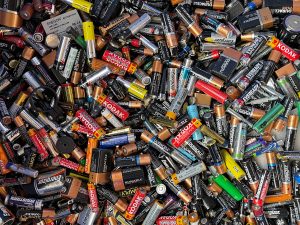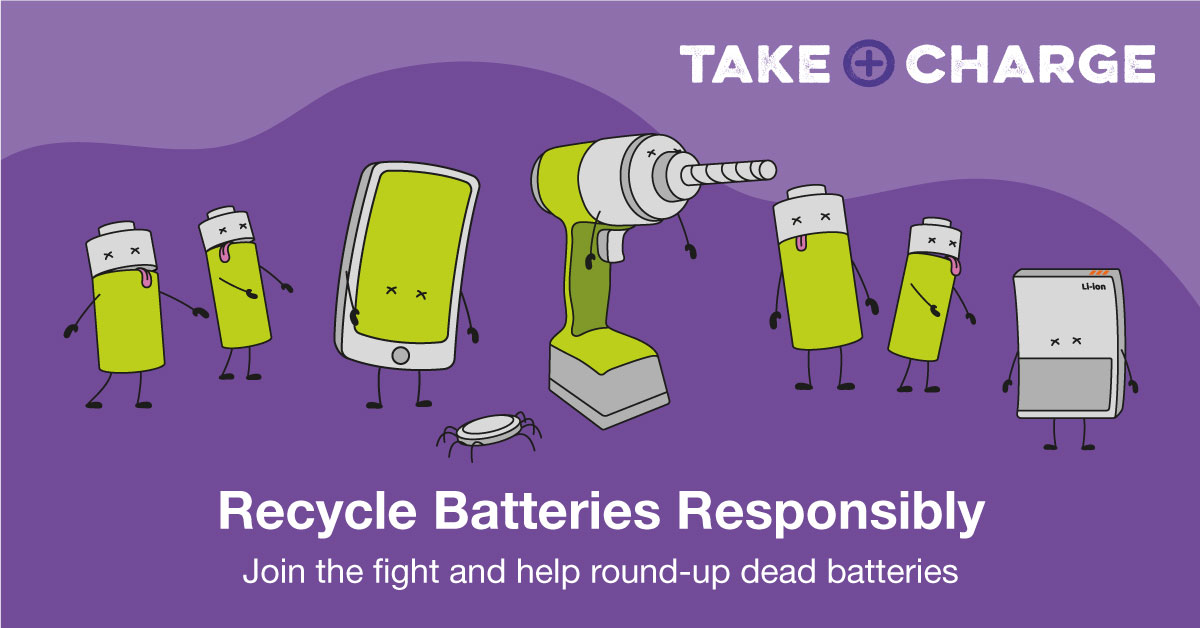Throwing dead batteries in the bin can cause fires. Don’t let your batteries turn into zombies, learn how to recycle them responsibly!
The burning issue of batteries
An estimated 600 million batteries are thrown away each year, with 189 million batteries used over Christmas alone. But do you know how to recycle your batteries?
Unlike many other household items, batteries cannot be placed in either your waste or recycling bin at home. However, around a quarter of us are putting batteries in our household bins according to Material Focus – and this can have explosive consequences.
Lithium-ion batteries are sparking more than just gadgets – lithium-ion batteries thrown in household rubbish bins have led to more than 1,200 fires in the waste system in 2023. Phil Clark, Emerging Energy Technologies Lead for the National Fire Chiefs Council, warns:
“Fires involving the incorrect disposal of lithium-ion batteries are a disaster waiting to happen.”
Between January and September 2024, ten serious fires have occurred in waste collection vehicles and at waste sites in East Sussex, with batteries believed to be a likely cause. Batteries are known to significantly contribute to this risk, highlighting the importance of proper disposal and recycling.
And with an increasing number of lithium-ion powered gadgets, toys and appliances around the home, the amount lithium-ion batteries in the UK waste stream is set to continually increase in coming years. Everyday items such as electric toothbrushes, vapes and phones all have lithium-ion batteries.
So how can we make sure we’re recycling batteries properly?
How to recycle your batteries in East Sussex
You can go to your local household waste and recycling site to dispose of your batteries. Many larger shops and supermarkets also take back dead batteries. Find where you can take your batteries for recycling here.
If you live in Wealden, Hastings, or Rother you can also dispose of your batteries and other electrical items at the kerbside. Simply place your batteries in a small carrier bag on top of your waste or recycling bin on collection day. Find out more in our article: Recycle your old electricals from home.

How to recycle vapes
With almost 5 million vapes being thrown away every week (almost four times as much as the previous year), they are fast becoming one of the biggest waste streams in the UK.
However, please don’t put these items in your waste bins, as they too pose a fire risk since they contain batteries. Plus, they could be recycled!
So how do you safely dispose of your vape?
Vapes, such as ELF bars, can be recycled via your kerbside small electrical service if you live in Hastings, Wealden and Rother (please note, that these should go in a separate carrier bag to any loose batteries you are recycling).
If you live in areas covered by Eastbourne or Lewes councils you can recycle vapes at any of our household waste recycling sites. You’ll need to book your visit to the tip starting from 24 November 2025.
There are also a number of takeback schemes across the county where you can safely dispose of your vapes – find a vape take back scheme local to you.
If your vape has a detachable battery please recycle this at battery recycling services, as detailed above.
Where do your batteries end up?
Household batteries collected at the kerbside and household waste sites are bulked at waste transfer stations and then taken to a facility, where they are sent on for recycling. The batteries are sorted by type before going through mechanical treatment to crush and screen the material. The material goes through a chemical treatment process before being recycled.
The resources gained from recycling batteries are the very same materials being mined in other parts of the world.
Rechargeable batteries
The best thing for the environment is to reduce the amount that we buy and use in the first place.
While disposable batteries are cheap, they take a lot of energy and resources for such a short lifespan. To be specific, it takes 50 times more energy to make a battery than it gives during its life.
Rechargeable batteries have come along way in recent years and will last for around 700 charges! In the long term, they will save you money and be better for the environment. Plus, they can still be recycled after. If one of your New Year’s resolutions is to be more green, why not make the switch to rechargeable batteries?
What else can I recycle from home?
Find out what you can and can’t recycle from your home with our ultimate guide to recycling.
Want to know what happens to your recycling in East Sussex? Find out with our animation!
Thank you for recycling!
Article updated November 2025.




